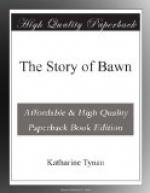“Hoity-toity! how can you know if you know nothing about him? Tell me again what he was like. I know every one who goes in and out of every house in the county except Damerstown, and there are too many of them for me, besides which old Dawson ruined my uncle Hercules. Was he tall? You say he was tall.”
“Tall and slight.”
“Regular features?”
“A straight nose; his face clean shaven except for a small dark moustache; a good deal of colour in his face and great vivacity.”
“And his eyes? There, you needn’t tell me. I ought to know. The eyes are grey with dark lashes. You might take them for black. It is Anthony Cardew to the life.”
“Snow-white hair,” I added.
“Snow-white hair,” Miss Bride repeated. “No, no. It can’t be Anthony Cardew, unless there are white blackbirds. Hair black as jet.”
“Perhaps Captain Cardew may have become white, sister,” Miss Henrietta put in humbly.
“White! What would make him white?” Miss Bride asked angrily. “He can’t be forty. I remember him the very day his sister was run away with—”
She pulled herself up suddenly, and turned to me with an air of great kindness.
“’Tis my tongue is running away with me,” she said. “Excuse me, Bawn, my dear. Your stranger sounds like Anthony Cardew, but I don’t see that it can be he. He was raven-black. Better think no more of him. I wouldn’t waste a thought on any man. I wonder why the Lord made them.”
I had stood up to go. I think I had known all the time that my fine gentleman and Anthony Cardew were one and the same, had understood all the time why he was so certain that his presence in our woods would be unwelcome to my grandparents.
“You never know where he might be, Anthony Cardew,” Miss Bride went on, holding my hand. “One day at one end of Europe, the next at the other. Don’t think of him, child. He is better worth thinking of than most men, but none of them are worth it. Good-bye, Bawn; be sure and write us word of all your fine doings.”
Miss Henrietta came with me to the phaeton to whisper in my ear that I was not to mind her sister’s odd views about gentlemen, because poor Bride lived in perpetual fear that she, Miss Henrietta, might marry and leave her.
CHAPTER XIV
THE MINIATURE
As we jogged along in the evening coolness and sweetness, we came upon Sir Arthur Ardaragh with little Robin on his shoulder. The boy shouted with joy when he saw me; and when I had stopped the phaeton he called down from his height about the picnic tea father and he had had in the fields, his little fat hand upon his father’s neck while he told it.
“Robin often won’t eat a good tea in the nursery,” his father explained. “I think he wants other little boys to make him eat; he eats a famous tea when we have it together out-of-doors and travel a distance before we have it.”




